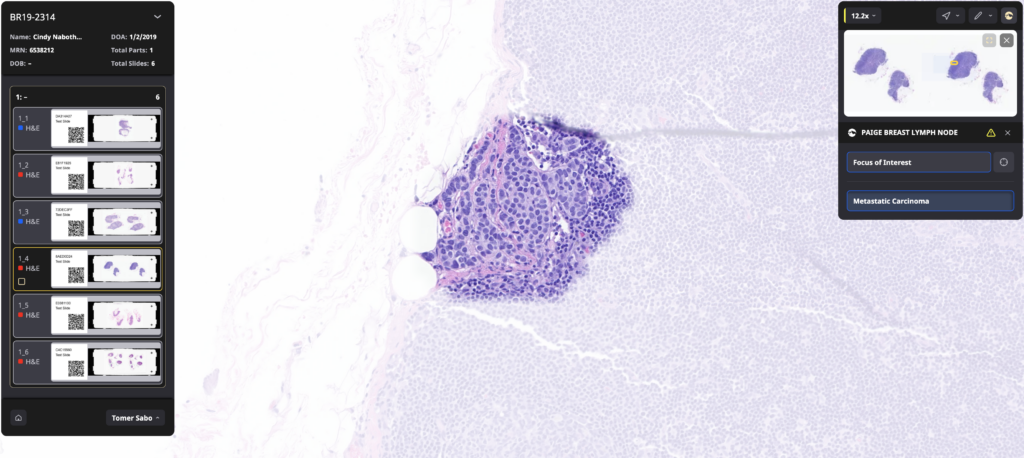AI Solutions
Pathology
- Digital Pathology
Paige is an end-to-end native cloud platform for digital pathology, AI workflows and novel biomarkers. Paige offers full scalability for going digital handling images from scanner to the final report for most efficient workflows and lowest cost of operation.
FullFocus™ is a complete web-based FDA-cleared* and CE-marked AI-native viewer for primary diagnosis. FullFocus offers workflow management capabilities, connects with multiple storage options, and can interface with various scanner platforms and LIS systems. This intuitive and responsive viewer provides a collaborative and pathologist-centric image review experience with advanced viewing of digital slides and AI results all in one system. FullFocus has the distinction of being the only FDA-cleared standalone viewer that is cloud and AI-native and allows pathologists to view slides using many different file formats.
- Cloud-based, responsive remote viewing on mainstream browsers
- Quick to deploy and requires limited maintenance
- Slides load in milliseconds for maximum efficiency
- Compatible with multiple scanner platforms and LIS systems
- Delivers AI results throughout the pathologists’ workflow
- CE Marked, FDA Approved, HIPAA Compliant, GDPR Compliant
Paige offers secure, scalable, and highly available storage options for pathology. Storage options are easily deployed through Amazon Web Services (AWS), can be stored in one of four regions globally, and require no capital expenditure.
By leveraging its proprietary machine learning technology and unique data, Paige is using AI to identify new biomarkers from digitized images of stained tissue. These biomarkers may be predictive of treatment outcomes, such as response to a therapy or class of therapies, disease progression, and survival.
Proven to improve pathologist accuracy and efficiency, Paige Prostate is a first-in-class software solution for the detection of the most common form of prostate cancer. Paige Prostate is the first and only AI-based pathology product to receive FDA marketing authorization for in vitro diagnostic (IVD) use in detecting cancer. This innovative diagnostic solution has also been granted CE marks for identification of cancerous areas and for determining primary and secondary Gleason patterns and tumor size, percentage, and linear extent.
- Validated in numerous studies with high-profile labs and published in many prestigious peer reviewed journals. Proven to work on data from hundreds of institutions worldwide
- Pathologists using Paige Prostate are significantly better able to detect cancer accurately and sign out cases more efficiently.
- First CE Mark for an AI-based pathology product
- First and only FDA-approved software to provide diagnostic support in the detection of prostate cancer

Paige Breast is designed to increase the accuracy of detection and classification of premalignant and malignant neoplasms of the breast. The software has received a CE mark for the identification of suspicious features on breast tissue and for slide level information about the presence of cancer
- Available now for Early Access, Paige Breast offers neoplasm subtyping which classifies neoplasms as ductal, lobular, in-situ, or invasive.
- Ability to identify ductal and lobular atypia and rare morphologies including mucinous, tubular, apocrine, micropapillary and solid papillary.
- Additional functionalities to be deployed soon includes microinvasion and calcification detection
Founded in 2017 by David Klimstra, MD and Thomas Fuchs, Dr.Sc. From MSKCC, Memorial Sloane Kettering Cancer. Global footprint with large pathology centers and more than +130 employees. +200M USD funding from leading global investors, including Johnson & Johnson and Microsoft.
Led by a team of experts in the fields of life sciences, oncology, pathology, technology, machine learning, and healthcare, Paige strives to transform cancer diagnostics. We make it possible not only to provide additional information from digital slides to help pathologists perform their diagnostic work efficiently and confidently, but also to go beyond by extracting novel insights from digital slides that can’t be seen by the naked eye. These unique tissue signatures have the potential to help guide treatment decisions and enable the development of novel biomarkers from tissues for diagnostic, pharmaceutical and life sciences companies.